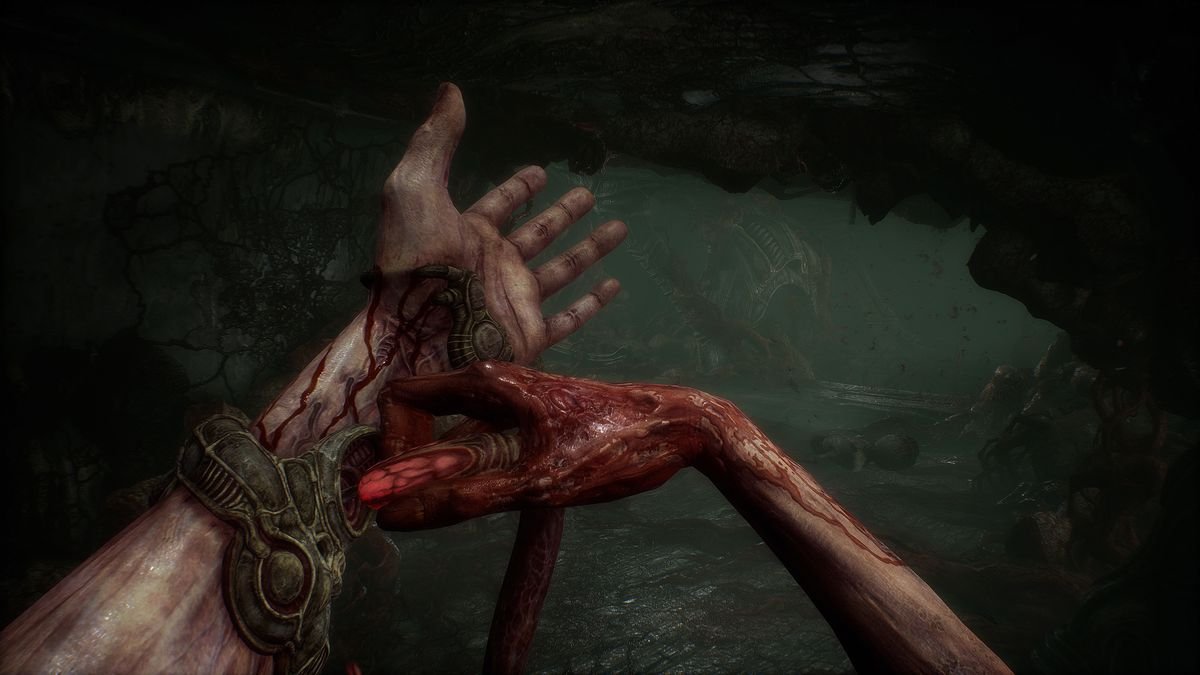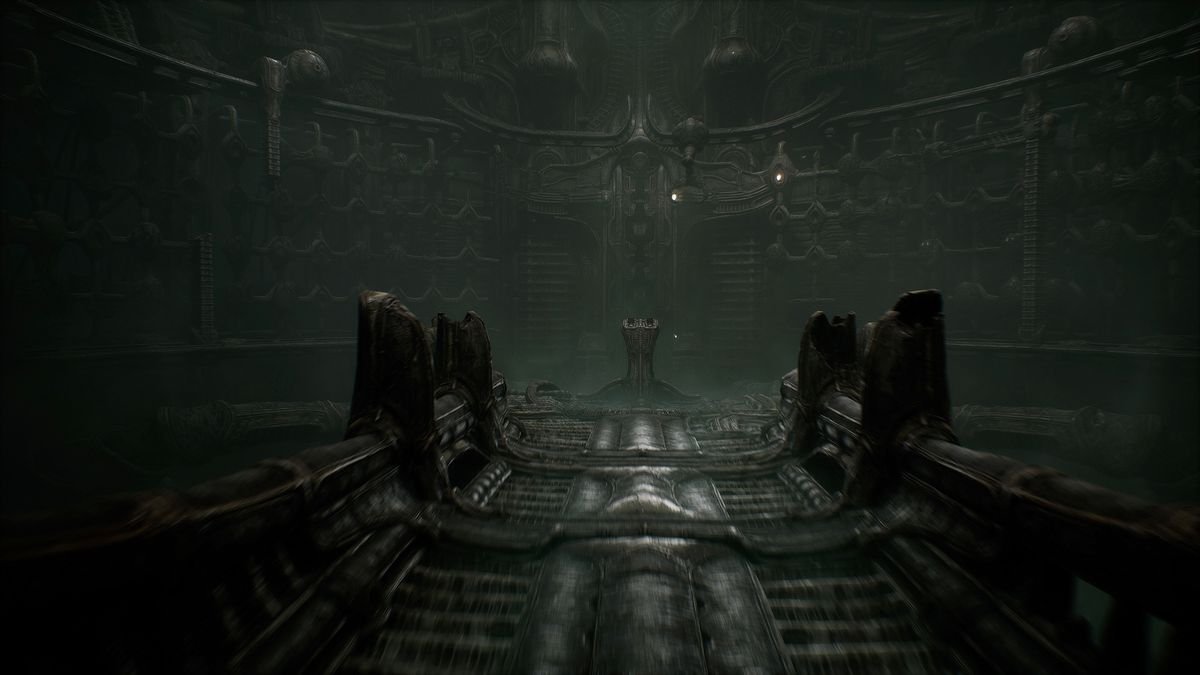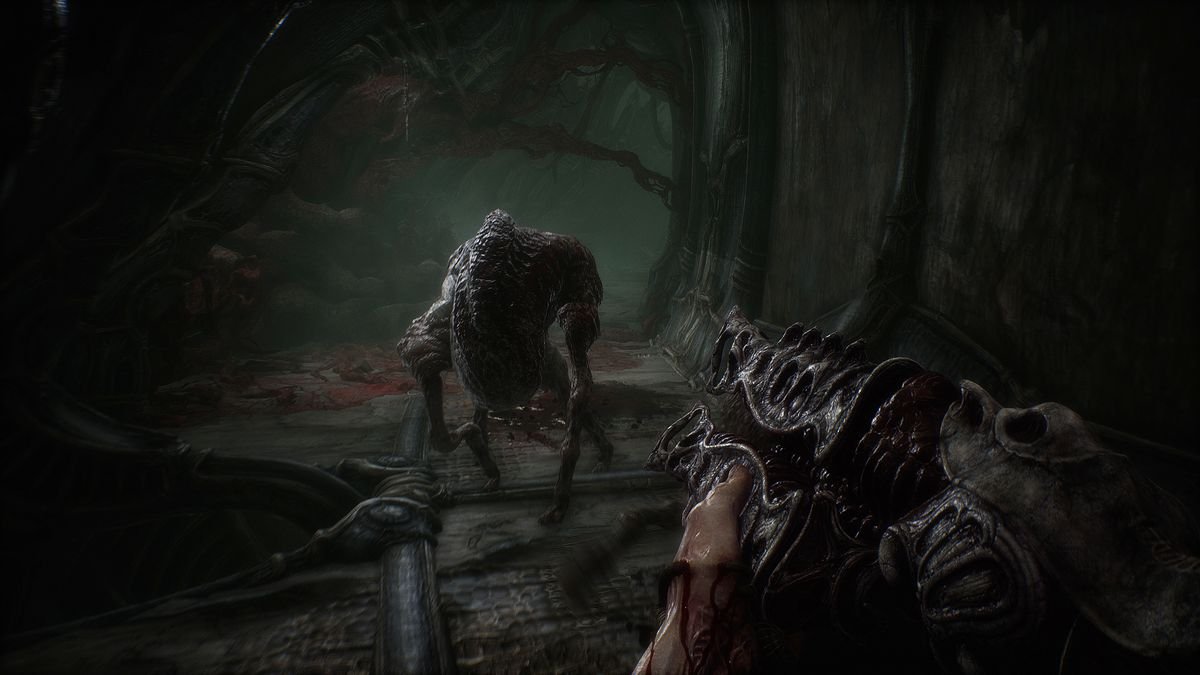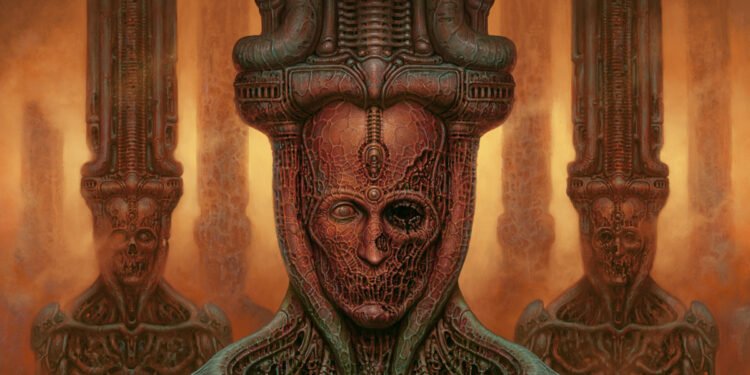Throughout Scorn’s long development period, Serbian developer Ebb Software has been vocal about the inspirations for its horror game debut. In crafting its alien terrors, the studio has looked to artists famous for their capacity to unsettle, whether in the desolate surrealism of Zdzisław Beksiński or the biomechanical grotesquerie of H.R. Giger.
The work of Giger in particular has been woven into narrative before, but never quite with the focus of Scorn. Before a single face is hugged, the 1979 film Alien takes care to ground us in human company. The two Dark Seed games, both ’90s point-and-click adventures, situate us in a “normal” world before throwing us headlong into all the Giger designs that wallpaper its parallel universe.
Scorn, however, doesn’t afford us the luxury of a familiar space. Even the player character is only vaguely humanoid, as a single glance down at its body in the game’s first-person point of view raises questions. Did tearing free from the rigid, bony tendrils that entombed this thing strip away an outer layer of skin to expose the musculature? Or do all the bodies of this species look like this? Does its grunt mean there’s a mouth beneath the layer of smooth flesh where we’d expect one to be?

Image: Ebb Software/Kepler Interactive
No internal monologue clarifies. No journal or lore codex explains. Forgoing things like maps, objective markers, collectibles, and helpful NPCs, Scorn is single-minded in its intent to maroon you within a totally alien universe. The game’s initial hours are easily its most inventive and atmospheric, forgoing jump scares and overt horror in order to build dread. It leaves you to trudge among the dispassionate metalwork, finding each environment built in service of strange, violent-looking machinery operated via control panels with finger-sized orifices.
While none of the machines are terribly complex once you discern their function, there are no tutorials or text beyond basic menu prompts, so you’re left with nothing more to go on than your own observations and experimentation. When you rotate the segments of a pipe-like contraption, you’ll have to pay attention to the differences in how the little parts shift. The puzzles scarcely iterate on each other, either, because to repeat puzzles would allow you to get familiar with the world; instead, you constantly move on to new devices with distinct operations to consider.
The initial puzzles take up a sizable chunk of the eventual eight-hour playtime, to the point where you might wonder how much combat features in the game at all. You do eventually acquire a health bar and a sort of mashing phallus as a weapon, but the first of the chittering, dripping flesh-shapes you encounter seem more territorial than malevolent. Scorn places you as the primary instigator of violence; you, after all, are the one bringing this abandoned machinery whirring back to life for one more demonstration of its cruel purpose: the tearing, squishing, and overall pulverizing of some livestock creature seemingly bred only to die.

Image: Ebb Software/Kepler Interactive
A few of Scorn’s machines seem a little too consciously calculated for shock value (one involves pressing a fetal creature into paste), but they all serve to make gory and explicit text out of an implicit truth: The wheels of industry demand a toll in blood. Even your weapon periodically collects a tax, since it’s attached to a back-mounted parasite that’s fond of viciously plunging its limbs into your guts.
There’s certainly a risk of Scorn’s very specific, violent sensibilities growing stale. But the game shifts its environment as you progress, with alien metalwork of an abandoned civilization gradually overtaken by pulsating flesh. The effect is sort of like when nature reclaims some abandoned structure, only this time, your path is blocked not by beautiful greenery but by the strung-together carcasses of countless penile abominations.
For a brief period, the game hits an acceptable middle ground, when the phallic creatures that want to hurt you are just plentiful enough to make you jump at the docile (though still disgusting) ones that merely adorn the environment. But as the creature encounters continue to escalate, the game’s design grows more conventional. To peel back the layers of this bizarre and horrible society is also to strip away the game’s early sense of invention and discovery. The items and mechanics underneath are distressingly ordinary, like a spread weapon that’s just a shotgun except wet and gross.

Image: Ebb Software/Kepler Interactive
To its credit, Scorn never shifts gears into an action-heavy shooter; even in the sections most crowded with enemies, the game retains a methodical pace that leaves you stressed about ammunition and health refills. But the dread of the strange and the obscure that it so carefully cultivates up to that point begins to fade. Where before you were hesitant to interact with certain control panels, you soon find yourself reloading the Gross Shotgun with the smooth familiarity of pressing the same “reload” button as every other game with less disgusting yet functionally similar weaponry.
Even the decline of Scorn’s tension feels disappointingly typical. The game simply doesn’t know where to go in order to retain the mystique of its powerful early hours, to the point where even the gun-parasite that’s supposed to be killing you devolves into hackneyed convention. On paper, it’s a fascinating concept: The thing that empowers you is also slowly killing you. In practice, all that happens is the screen going red around the edges while the controller vibrates and you wait for the interruption to pass.
By the time the parasite does finally obstruct your ability to use machines or change weapons, the damage is already done. There are few enemies left and the game is almost over, so whatever additional tension might have resulted from these restrictions never materializes. Scorn is a transportive experience to be sure, at times a genuine masterwork of visual craft. But the unfulfilled possibilities linger a little too prominently, a reminder that it falls short of being a mechanical masterpiece, too.
Scorn was released on Oct. 14 on Windows PC and Xbox Series X via Game Pass. The game was reviewed on PC using a pre-release download code provided by Kepler Interactive. Vox Media has affiliate partnerships. These do not influence editorial content, though Vox Media may earn commissions for products purchased via affiliate links. You can find additional information about Polygon’s ethics policy here.

















































